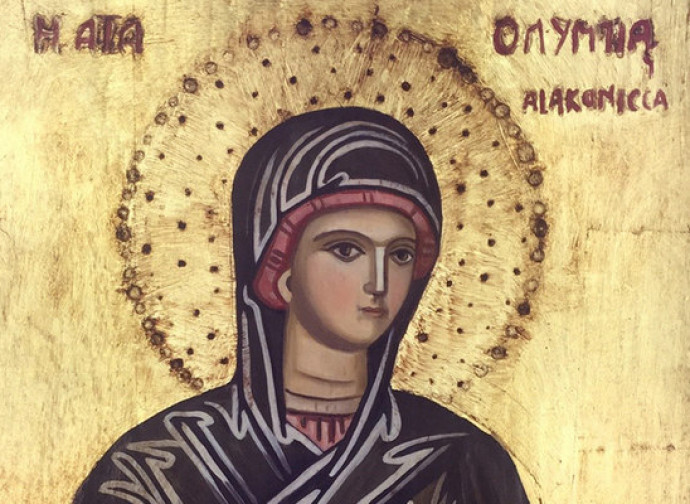Saint Olympia
The 17 letters Saint John Chrysostom wrote to Olympia (361-408) from his exile witness the esteem she enjoyed within the Christian community. She in turn was persecuted during the last few years of her life by the enemies of the deposed Eastern patriarch.

The 17 letters Saint John Chrysostom wrote to Olympia (361-408) from his exile witness the esteem she enjoyed within the Christian community. She in turn was persecuted during the last few years of her life by the enemies of the deposed Eastern patriarch. Born to a noble Constantinople family and orphaned in childhood, Olympia was entrusted to Theodosia, a woman well-known for her culture and Christian piety, who conveyed to her her own love for the Holy Scriptures. The girl grew fortified by the penances she offered to God and, around the age of 23, married Nebridius, but was widowed only 20 months later. Emperor Theodosius wanted her remarry one of his cousins, but she refused: "If my King had wanted me to live with a man, he would not have taken my first one." Disgruntled, the Emperor seized all her possessions. Five years later, however, having appreciated her steadfast virtue and the way she accepted poverty, he regretted his actions and restored her property.
Immediately Olympia employed her wealth for works of charity, building a hospice for consecrated persons to rest during their journey. This was at the time of patriarch Nectarius, who appointed her deaconess. The widow then founded a monastery, which due to her example attracted many young women from the nobility of Constantinople. Their number soon reached 250. When John Chrysostom was summoned there and consecrated patriarch, a holy friendship was established between him and Olympia, whom the archbishop took under his spiritual direction. Meanwhile, he attacked the licentiousness of the powerful and the worldly, and the weak faith of most of the citizens, thus attracting hostility both at the court of Emperor Arcadius and his wife Eudoxia and among some members of the clergy. At that time Olympia had a hospital and an orphanage built, while supporting Chrysostom's moral and spiritual renewal movement with the humble provisions of food and clothing.
When John was definitively exiled from Constantinople in 404, Olympia – along with other Christians – was unjustly accused of burning a church and the episcopal see. She refused the compromise offered to her by the prefect, namely, her acceptance of the usurper Arsacius as the new patriarch in exchange for being left in peace: for this reason she was sentenced to pay a fine. She decided to retire to Cyzicus. But later, as the persecution against the "Johannites" continued, she was tried a second time and exiled to Nicomedia.
Here she died in 408, a year after Chrysostom, with whom she had maintained epistolary contact, receiving comfort and encouragement to persevere in the faith: “I do not renounce a solid hope – wrote her friend – because I think of the Helmsman of the universe, [...]whose attitude is not to suppress evils at their onset but when they have grown to reaching almost their peak and most people have lost all hope: it is then that He intervenes with extraordinary prodigies, manifesting his own power and strengthening the patience of those who fall.”
